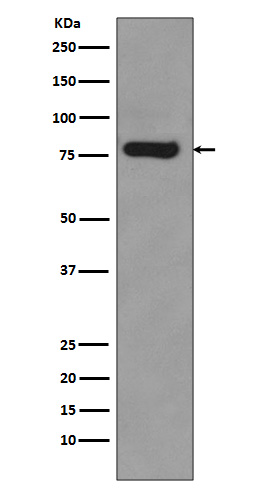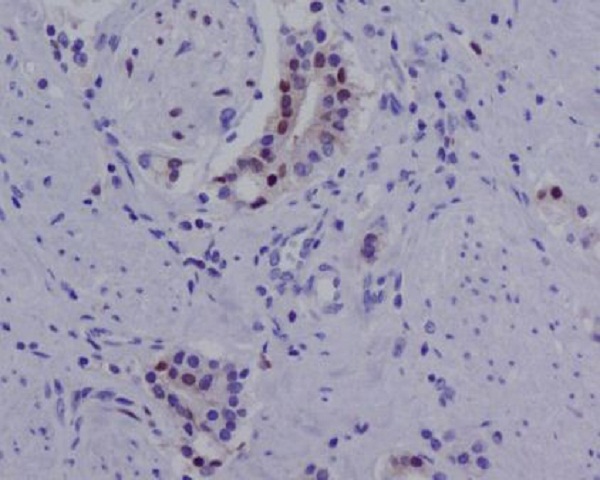

| WB | 咨询技术 | Human,Mouse,Rat |
| IF | 咨询技术 | Human,Mouse,Rat |
| IHC | 1/100-1/200 | Human,Mouse,Rat |
| ICC | 技术咨询 | Human,Mouse,Rat |
| FCM | 咨询技术 | Human,Mouse,Rat |
| Elisa | 咨询技术 | Human,Mouse,Rat |
| Aliases | AR; Androgen receptor splice variant 3; AR-V7(AR3);;Androgen receptor (AR3 specific) |
| WB Predicted band size | Calculated MW: 99 kDa ; Observed MW: 80 kDa |
| Host/Isotype | Rabbit IgG |
| Antibody Type | Primary antibody |
| Storage | Store at 4°C short term. Aliquot and store at -20°C long term. Avoid freeze/thaw cycles. |
| Species Reactivity | Human |
| Immunogen | A synthesized peptide derived from human Androgen receptor (AR3 specific) |
| Formulation | Purified antibody in PBS with 0.05% sodium azide,0.05% BSA and 50% glycerol. |
+ +
以下是3-4篇关于雄激素受体(Androgen Receptor, AR)抗体的代表性文献及其摘要概括:
---
1. **文献名称**:**"Mutation of the androgen-receptor gene in metastatic androgen-independent prostate cancer"**
**作者**:Taplin ME, Bubley GJ, Ko YJ, et al.
**摘要**:该研究利用特异性AR抗体检测了激素抵抗性前列腺癌患者的肿瘤样本,发现AR基因突变导致受体结构改变,可能促进癌细胞对雄激素的异常响应,为抗雄激素治疗耐药性提供了分子机制解释。
---
2. **文献名称**:**"Androgen receptor signaling in prostate cancer progression"**
**作者**:Gelmann EP.
**摘要**:本文综述了AR信号通路在前列腺癌中的作用,强调了通过特异性AR抗体进行受体定位和表达水平检测的技术应用,并讨论了AR变异体在疾病进展中的临床意义。
---
3. **文献名称**:**"Characterization of monoclonal antibodies against androgen receptor"**
**作者**:Swerdloff RS, Neri R.
**摘要**:研究团队开发并验证了一组高特异性的抗AR单克隆抗体,通过免疫印迹(Western blot)和免疫组化(IHC)证实其在检测人组织及细胞系中AR表达的可靠性,为后续功能研究提供了工具支持。
---
4. **文献名称**:**"Androgen receptor (AR) coregulators in prostate cancer: Role in androgen resistance and AR stability"**
**作者**:Heinlein CA, Chang C.
**摘要**:该研究利用AR抗体探究了AR与共调节蛋白的相互作用,发现共调节因子通过影响AR稳定性参与前列腺癌耐药性形成,为靶向AR信号通路的治疗策略提供了新思路。
---
以上文献涵盖了AR抗体的开发、验证及其在疾病机制和临床研究中的应用。如需具体期刊信息或发表年份,可进一步补充关键词查询。
The androgen receptor (AR) is a nuclear hormone receptor that plays a critical role in mediating the biological effects of androgens, such as testosterone and dihydrotestosterone. It regulates gene expression by binding to specific DNA sequences, influencing cellular processes like proliferation, differentiation, and survival. AR signaling is essential for male sexual development and reproductive function but is also implicated in pathologies, including prostate cancer and androgen insensitivity syndromes.
AR antibodies are essential tools for studying the receptor's expression, localization, and function in research and diagnostics. They are widely used in techniques like Western blotting, immunohistochemistry (IHC), and immunofluorescence to detect AR protein levels in tissues or cell lines. In prostate cancer research, AR antibody staining helps assess tumor aggressiveness, treatment response, and resistance mechanisms, as AR overexpression or mutations often drive disease progression.
These antibodies target specific AR domains, such as the N-terminal transactivation domain, DNA-binding domain (DBD), or ligand-binding domain (LBD). Monoclonal antibodies (e.g., AR441. AR-V7 specific clones) offer high specificity, while polyclonal antibodies may detect broader epitopes. Validation of AR antibodies is crucial, as post-translational modifications (e.g., phosphorylation) or splice variants (e.g., AR-V7) can affect detection. Commercial AR antibodies are routinely validated using knockout cell lines or competitive assays to ensure reliability in experimental and clinical settings.
×